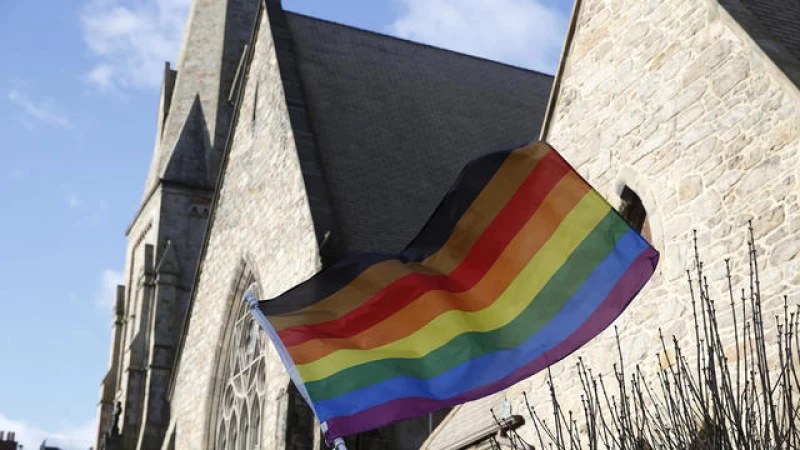Bishop Karen Oliveto to Retire as United Methodist Bishop
Oliveto was visibly emotional as she announced her upcoming retirement in a few months. As the church's first openly gay bishop, her journey has been filled with uncertainty and challenges.
"Every day of my ministry, I've had to wonder, is this the day my ordination will be taken from me?" Oliveto shared.
However, the recent United Methodist General Conference brought a significant change. The global legislative body voted to overturn all bans on LGBTQ individuals within the church. These groundbreaking decisions include redefining marriage as a lifelong covenant between "two people of faith" and lifting the prohibition on LGBTQ clergy.
The General Conference also eliminated a 52-year-old statement declaring homosexuality as "incompatible with Christian teaching."
"To hear someone say, 'we need to repent of the harm we've done.' I didn't realize my body was waiting for that," expressed Oliveto.
These changes, effective immediately, present new opportunities for LGBTQ members within the church. For instance, a 24-year-old individual, identified as J.M., is actively pursuing ordination as a deacon in the United Methodist Church.
"We have been here and we have been fighting, and our fight has been worth it," they said. "It shows that progress can happen and has happened."
J.M. said they felt they needed to navigate around their identity as part of the LGBTQ community and not address it directly until the General Conference.
"Queer kids … the church once told them 'you're loved,' but then made that love conditional when they started to question their sexual orientation or gender identity," said Oliveto. "They're going to hear, 'We love you. We want you to be who God made you to be.' That is huge. Lives will be saved."
The General Conference overwhelmingly supported the end of anti-LGBTQ church laws, after more than 7,600 mostly conservative congregations chose to disaffiliate from the United Methodist Church by the end of last year. That equates to about a quarter of U.S. Methodist churches.
Those U.S. congregations were able to leave because of a 2019 special General Conference that passed a plan for congregations that wished to depart for "reasons of conscience" regarding human sexuality.
There was widespread joy and celebration at the General Conference that concluded on Friday, but there are still global members, including those from central conferences in Africa, Europe and the Philippines, who do not stand by the new changes.
During a recent church vote on changing the stance on marriage, a group of African delegates raised their voices in protest, as reported by the United Methodist News Service.
Reverend Jerry Kulah, a delegate from Liberia, expressed his views at the rally, stating, "We do not believe we know better than the Bible."
Alongside the marriage decision, the General Conference also approved a constitutional amendment referred to as worldwide regionalization. This amendment allows congregations that disagree with the church's new inclusive stance on LGBTQ individuals to tailor certain aspects to align with their beliefs.
Under this new system, regional conferences will have the flexibility to customize sections of the Book of Discipline, the church's rulebook, without being bound by decisions primarily influenced by the U.S. This includes matters related to the ordination and marriage of LGBTQ members.
For the regionalization amendment to be enacted, it must secure the support of at least two-thirds of annual conference voters, who represent local governing bodies. The final voting outcomes are anticipated to be confirmed by late next year.
Despite the introduction of regionalization, some congregations may opt to part ways with the United Methodist Church.
By the end of 2023, several congregations had already joined the Global Methodist Church, a new denomination established in May 2022, which upholds regulations against LGBTQ ordination and marriage.
Keith Boyette, a former United Methodist Church member who is overseeing the Global Methodist Church during its transitional period, said the Global Methodist Church now has more than 4,500 churches, about 90% of which are in the U.S. It will hold its General Conference in San Jose, Costa Rica in September.
Boyette does not think regionalization will be helpful for the United Methodist Church.
"I believe in the long run, there will be a decline in the membership of the United Methodist Church because of the decisions it has made," he said.
But Bishop Karen Malone, the president of the Council of Bishops of the United Methodist Church, is confident regionalization has the ability to strengthen the church.
"It allows for a more contextualized ministry in order to address the specific social and cultural contexts," she said.
Malone recognizes that some congregations still may decide to leave following the decisions made at the General Conference. But she also believes that "others will come home," she said. "That some were waiting and have left for a season."
As the church moves forward, Malone said there is a renewed spirit of hope with the stance that all people are fully welcomed into the total life of the church.
As Oliveto reflects on the changes and prepares for life beyond the ministry, she said, "I feel like I'm leaving the church better than I found it."







